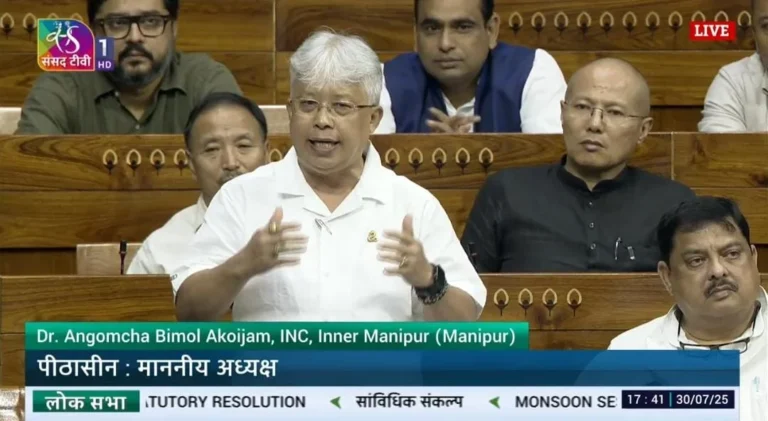Dengue Cases Surge in Imphal: A Growing Concern
Summary
Manipur’s capital, Imphal, is witnessing a worrying rise in dengue cases, adding to the state’s public health challenges. The increase in cases, particularly in urban areas, has sparked concern among health officials, who are now taking measures to control the spread of the disease. The local authorities are urging citizens to remain vigilant and adopt preventive measures to combat the spread of dengue, such as maintaining cleanliness and avoiding stagnant water where mosquitoes breed.
Understanding the Dengue Outbreak in Imphal: Causes, Impacts, and Prevention
Introduction
Manipur, a beautiful northeastern state in India, is currently grappling with an alarming rise in dengue cases, particularly in its capital, Imphal. While this disease is not new to the region, the current spike in cases has caused concern among health officials and the public alike. With increased urbanization, changing weather patterns, and inadequate preventive measures, dengue has resurfaced as a growing threat in Imphal. This article delves deep into the causes behind this surge, its impacts on the community, and ways to prevent further outbreaks.
What Is Dengue and Why Is It Dangerous?
The Dengue Virus and How It Spreads
Dengue is a viral disease transmitted by Aedes mosquitoes, mainly Aedes aegypti and Aedes albopictus. These mosquitoes breed in stagnant water, making urban areas with poor sanitation particularly vulnerable. Once a mosquito carrying the dengue virus bites a person, it can lead to flu-like symptoms such as high fever, severe headache, pain behind the eyes, joint and muscle pain, and in severe cases, internal bleeding and organ failure.
What makes dengue particularly dangerous is that there is no specific treatment or vaccine for the disease. While most cases are mild, severe dengue (also known as dengue hemorrhagic fever) can be life-threatening. That’s why it’s crucial to control the mosquito population and prevent bites.
Why Are Dengue Cases Rising in Imphal?
Urbanization and Environmental Factors
One of the primary reasons behind the rise in dengue cases in Imphal is rapid urbanization. As the city grows, construction projects, poor waste management, and an increase in stagnant water provide the perfect breeding grounds for mosquitoes. The monsoon season exacerbates the problem as water accumulates in open spaces, creating a fertile environment for mosquito larvae.
Moreover, the changing climate patterns in the region, particularly warmer temperatures and irregular rainfall, have contributed to the prolonged breeding season of mosquitoes, allowing them to multiply faster and spread the virus more widely.
Lack of Public Awareness and Preventive Measures
Despite the growing threat of dengue, there remains a significant lack of public awareness about the disease and how to prevent it. Many residents in Imphal may not realize the importance of keeping their surroundings clean and free of stagnant water. Additionally, not all households use mosquito nets or repellents, increasing their risk of being bitten by an infected mosquito.
Public health campaigns and educational programs about dengue prevention have been inconsistent, leaving many people unaware of the basic steps they can take to protect themselves and their families. As a result, dengue continues to spread rapidly throughout the city.
Impact of the Dengue Outbreak on Imphal
Strain on the Healthcare System
The rise in dengue cases has put tremendous strain on Imphal’s healthcare system. Hospitals and clinics are witnessing a surge in patients displaying dengue symptoms, overwhelming healthcare providers. This increased burden has stretched medical resources thin, and there are concerns about the city’s ability to manage the outbreak if cases continue to rise.
Economic and Social Impact
Dengue outbreaks can have far-reaching economic and social implications. Infected individuals often have to take time off work to recover, leading to a loss in productivity. Families are also burdened with the cost of medical treatment, particularly in severe cases that require hospitalization. In addition, communities with high infection rates may experience social disruption as people avoid public spaces and gatherings for fear of contracting the virus.
Government Response and Preventive Measures
Steps Taken by Local Authorities
Recognizing the gravity of the situation, Manipur’s health department has ramped up efforts to contain the dengue outbreak. Public health campaigns are being launched to raise awareness about dengue prevention, focusing on eliminating mosquito breeding grounds and promoting the use of mosquito repellents and nets.
Local authorities have also begun fogging operations in dengue-affected areas to kill adult mosquitoes and reduce the mosquito population. Additionally, health officials are conducting door-to-door inspections to ensure that households are not harboring mosquito breeding sites.
Importance of Public Participation
While the government plays a crucial role in controlling the outbreak, public participation is equally essential. Residents of Imphal must take responsibility for keeping their surroundings clean and free of stagnant water. Simple measures, such as covering water containers, cleaning flower pots, and using mosquito nets, can go a long way in preventing the spread of dengue.
Communities should also come together to organize clean-up drives in neighborhoods and public spaces. By working collectively, the people of Imphal can help reduce the mosquito population and curb the spread of the virus.
How to Protect Yourself from Dengue
1. Eliminate Breeding Sites
The most effective way to protect yourself from dengue is by eliminating mosquito breeding sites. Make sure there is no stagnant water in or around your home. Empty water containers, clean out gutters, and dispose of any discarded items that could collect rainwater.
2. Use Mosquito Repellents
Apply mosquito repellent on exposed skin to avoid mosquito bites. Use products that contain DEET, picaridin, or oil of lemon eucalyptus for the best protection. Also, consider wearing long-sleeved clothing and pants to minimize skin exposure.
3. Sleep Under Mosquito Nets
Using mosquito nets while sleeping is another effective way to prevent bites, especially at night when mosquitoes are most active. If possible, install screens on windows and doors to keep mosquitoes out of your home.
4. Use Mosquito Coils or Electric Mosquito Killers
In addition to repellents, consider using mosquito coils or electric mosquito killers to reduce the number of mosquitoes inside your home.
The Road Ahead: Can Imphal Overcome This Dengue Crisis?
Strengthening Healthcare Infrastructure
While controlling the current outbreak is crucial, it’s equally important to build a more resilient healthcare system that can better manage future dengue outbreaks. The government must invest in healthcare infrastructure, provide adequate resources to medical facilities, and train healthcare professionals to respond quickly and effectively to dengue cases.
Increasing Public Awareness
Long-term success in controlling dengue in Imphal will require sustained efforts to raise public awareness about the disease. Continuous education campaigns should be carried out to inform residents about how dengue spreads and how they can protect themselves. By fostering a culture of vigilance and preventive action, Imphal can become more resilient to future dengue outbreaks.
Collaborating with International Health Organizations
Manipur can also benefit from collaborating with international health organizations like the World Health Organization (WHO) and UNICEF to implement best practices in dengue prevention and control. These partnerships can provide valuable resources, technical expertise, and funding to strengthen the state’s response to the dengue crisis.
Conclusion
The rise in dengue cases in Imphal is a significant public health concern that requires urgent attention. While local authorities have taken steps to address the outbreak, the situation underscores the need for a more robust healthcare system, improved public awareness, and proactive community participation in dengue prevention. With collective effort from the government, healthcare providers, and the public, Imphal can overcome this challenge and reduce the impact of dengue on its residents.
FAQs
- What causes dengue outbreaks in urban areas like Imphal?
Urbanization, poor waste management, and stagnant water create ideal breeding grounds for mosquitoes, leading to dengue outbreaks. - What are the symptoms of dengue?
Symptoms include high fever, severe headache, pain behind the eyes, joint and muscle pain, and in severe cases, internal bleeding. - How can individuals protect themselves from dengue?
Preventing mosquito bites by using repellents, sleeping under mosquito nets, and eliminating stagnant water around your home can help protect against dengue. - What is the government doing to control the outbreak in Imphal?
The government has launched public health campaigns, conducted fogging operations, and carried out inspections to eliminate mosquito breeding sites. - Why is public participation important in preventing dengue?
Public participation is essential in keeping communities clean and free of stagnant water, thereby reducing mosquito populations and preventing the spread of dengue.



